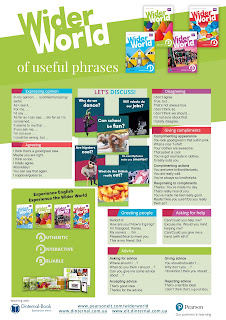 |
| Michael Hudson |
With only ONE WEEK left before the closing date in our Wider World competition, here's another guest post from Dinternal's Michael Hudson. Michael's from the north-east of England but he's now based in our Kyiv office, where he's been reading all your work and judging the monthly prizes since the competition started in May. The deadline for entries is midnight on October 13th - our marketing team will wait until then before closing the entry form because so many of you have been sending us your work late at night recently. If you can stay awake, so can we. The wider world is waiting...
Hello from my Hometown began on May 1st and ends on another memorable date, Friday October 13th! Does the mention of Friday and 13th make you feel nervous about suffering from bad luck? Then you might have a problem with
Paraskevidekatriaphobia!!!
Paraskevidekatriaphobia isn't just an incredibly hard word to spell. It also describes the fear of Friday the 13th. It was first used in the early 1990s by an American psychotherapist who combined the Greek words paraskevi (Friday) and dekatria (thirteen) with the suffix -phobia. Apparently, he also claimed that anyone who could pronounce the word would immediately be cured.
But why do so many people consider Friday 13th to be unlucky? The truth is that
nobody knows for sure. Some people say the superstition dates back to a biblical story or a Viking legend. Others believe it started on October 13th 1307 when King Philip IV of France ordered the arrest and torture of hundreds of Knights Templars. Whatever the reason, a recent study in the USA estimated that over 17 million people in that country alone are affected by a fear of Friday 13th. Travel south of the border to Mexico, however, and they'll tell you that it's
Tuesday 13th you should really be afraid of....

Our international team at Dinternal Books all know that cultural awareness is a vital skill. That's why we've decided to offer a very special prize for
13 lucky winners this Friday 13th! All you have to do to be in with a chance of winning is to send in your entry before
noon next Frida
y. In the afternoon, I'll pick 13 winners at random from all the entries we've received since May. So Friday 13th could finally be your lucky day!
The prize will be a copy of Pearson's Culture Close Up DVD for you to use with your students in class. Each DVD includes
10 videos on aspects of culture in Britain and the USA. The videos come together with ready-made worksheets at A1 and A2+ level and teacher's notes to save you time while you're preparing for class.
There are five videos using British English and five that use American English. Each video comes with easier and more challenging voice-overs so you can decide on the level of difficulty for your students. If you want, you can also play them with subtitles. The topics include
school life in the UK, music, sport, cities in the USA and festivals, which means you can introduce your students to British and American culture using language they understand and through topics they'll find engaging, relevant and fun.
Even if you don't win,
every entry we receive before midnight on Friday 13th will go into the grand prize draw to get some of our native speaker methodologists at your school for one whole day. If any of your students still haven't conquered their fear of Friday 13th, we can start by helping them to pronounce
that word....
Good luck!
Michael










